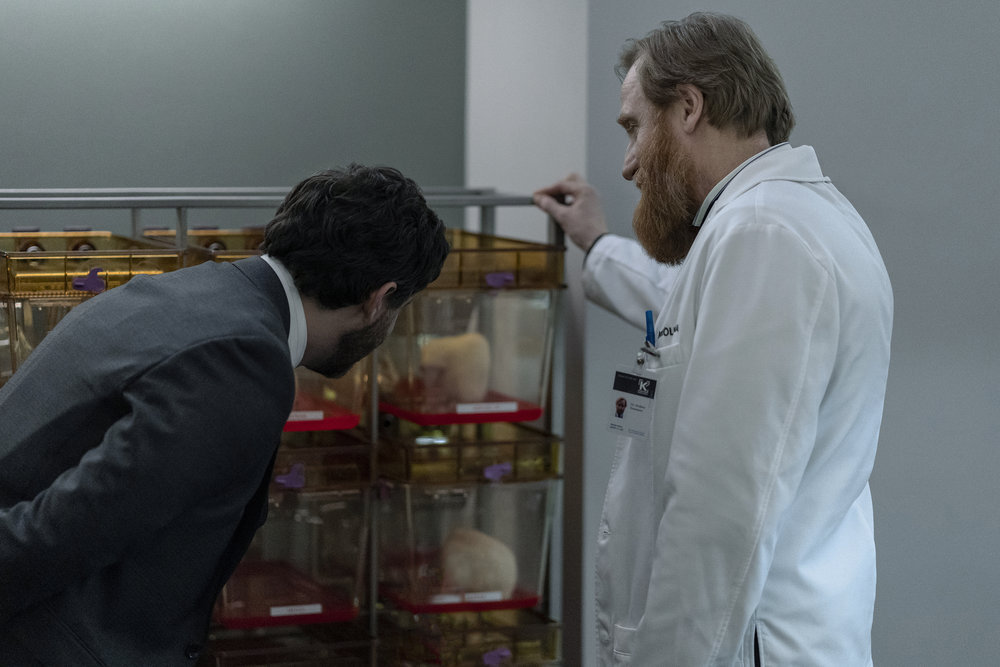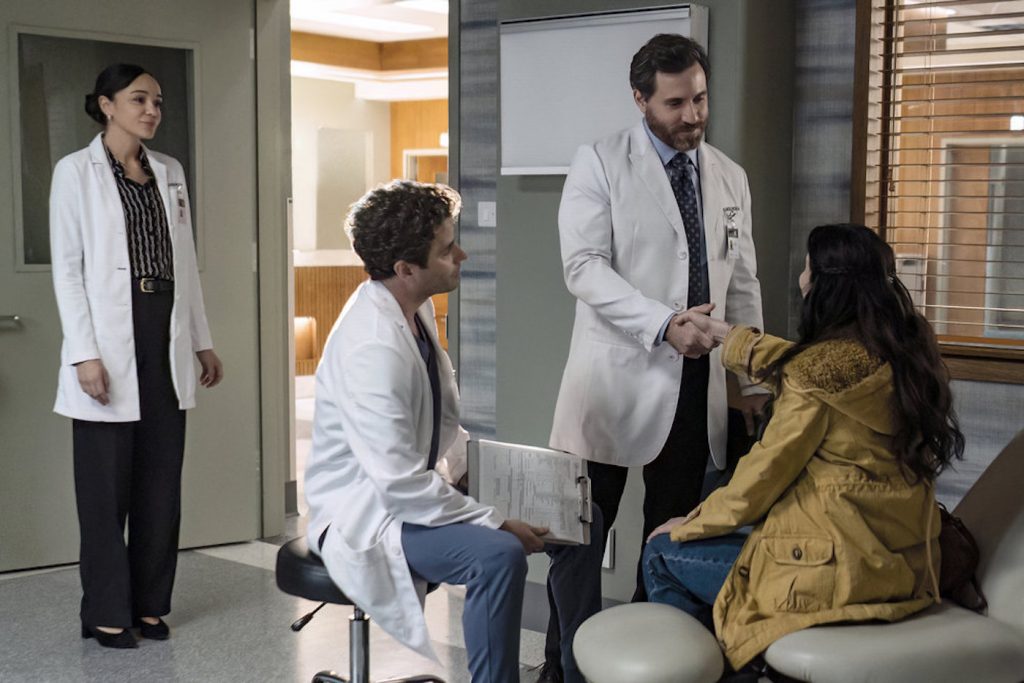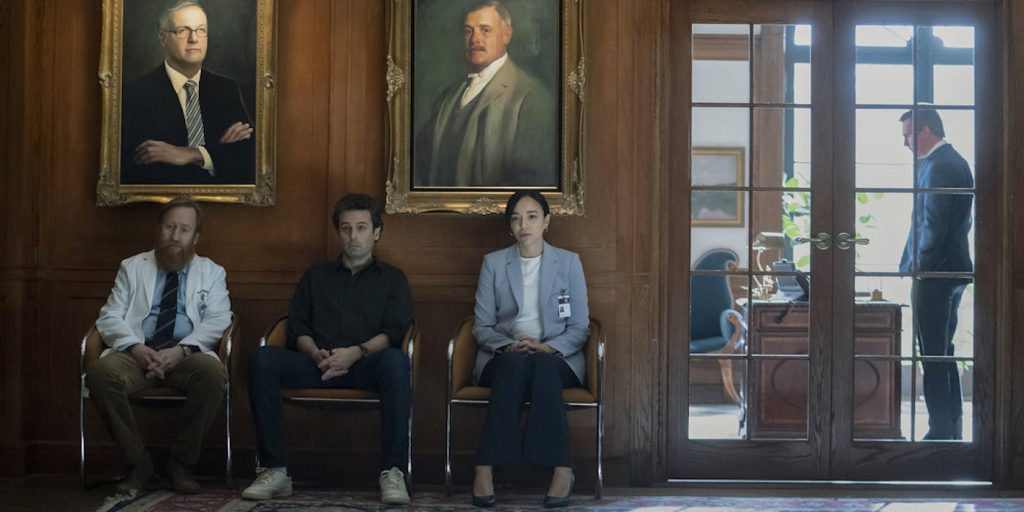“Dr. Death” Showrunner, Executive Producer & Stars on Season 2
In the second season of the celebrated Peacock series Dr Death, the show takes on another doctor featured on the hit Wondery true crime podcast, “Miracle Man,” Paolo Macchiarini. The story is of the world-renowned surgeon (played here by Edgar Ramirez) celebrated for his groundbreaking work in regenerative medicine and organ transplantation, but ultimately disgraced by his misconduct, dangerous practices, and web of deceit.
His rise and fall are, in part, influenced by the romantic relationship Macchiarini built with reporter Benita Alexander (Mandy Moore), who first covered and brought his story to a wider audience, then broke a cardinal rule in journalism by becoming intimate with her source. The doctor’s duplicity extended beyond his practice and medical research to lies in his relationship with Benita. She eventually connected with whistleblowers inside the medical community to stop Macchiarini and his surgeries, which were leading to fatalities across the world.
For the second season of Dr. Death, writer and producer Ashley Michel Hoban took over from first season showrunner Patrick Macmanus, who serves as executive producer on season two. The Credits spoke to Hoban and Patrick Mcmanus, as well as three of the series stars, Gustaf Hammarsten, Ashley Madekwe, and Luke Kirby, who play doctors Anders Svensson, Ana Lakshmi, and Nathan Gamelli on the show. Their three characters are an amalgamation of the many doctors who worked with Macchiarini but came to realize his research and medical practice were not only flawed, but dangerous.
Ashley Michel, you listened to the Wondery podcast a number of times to imbue this season with the spirit of the true story. What struck you as being essential to connecting audiences to the story we see?
Ashley Michel Hoban: Yesim’s story, I think, for most people, and certainly for me, hit on a different level. It was Yesim Cetir, the Turkish girl who had tracheal surgery and went through so much. The more I listened to her story, the more I think I got a sense of what the other doctors were going through around her, witnessing her journey, and trying to make sense of how it happened while it was happening. That became incredibly important, particularly to the whistleblower story, particularly to Luke Kirby’s character. In the story, these doctors are an amalgamation of different people because there are so many doctors that helped take down Paolo Macchiarini that we had to combine them into multiple characters, but the way that patient specifically affected him and his character became a real tentpole for the whole season.
Gustaf, what was your experience working with Ashley Michel as showrunner?
Gustaf Hammarsten: She was fantastic because we could collaborate, work with her, and talk to her at any time during the process. She was always inviting us to offer our take on what we were doing, and asking if we had any input, then would absorb this information and sometimes add an element to the story, which was wonderful.

Ashley, there’s a powerful chemistry between the three characters that eventually band together as whistleblowers. Was that also the case with your three actors?
Ashley Madekwe: Yes! I had an instant camaraderie with Gustaf and Luke, but it felt like the scenes were written that way. Also, on one of our first days, we were all waiting while they were shooting a big crowd scene, and we started talking, and we started talking at a deeper level immediately, getting to the meat of the conversation and putting the world to rights.

Ashley Michel, this season has some pretty intense surgery scenes.
Ashley Michel Hoban: We had lots of practice in season one doing surgeries. I do think we get a lot more graphic this season. We have way more blood and way more rats. We did want it to feel very real, so we had an incredible special effects makeup team and a really wonderful visual effects team that helped get us over the finish line for those surgical scenes. We also had this awesome surgical technical advisor who was always on set and has been a part of it since season one.
Gustaf, Ashley, and Luke, all three of you observed surgeries as part of preparing for your roles. How did that impact your performances?
Ashley Madekwe: I think they were really important, so when we were doing our surgery scenes, we could be in the moment. There’s an element of being slightly removed from it because when you’re there and the patient is on the table, they are completely draped, so the only thing that’s exposed is the area that’s going to be operated on. It’s almost like you’re not looking at a person.
Luke Kirby: It was remarkable how innocuous it felt. I had to keep reminding myself that there was a patient there. I know a surgeon in those moments really does have to zone in on the mechanics of the body, not the preciousness and precariousness of life. It really put me in touch with the tightrope that a surgeon has to walk in those rooms.
Ashley Madekwe: Surgery is a real mix between the aggressive and the delicate.
Ashley Michel, can you talk about the arc the whistleblowers have in terms of shifting from working with Dr. Macchiarini to calling him to account and the importance of this to the second season?
Ashley Michel Hoban: One of the themes we were trying to hit this season is the idea of one person’s voice having a ripple effect around the world bigger than they could have imagined. The way Benita and the whistleblowers come together personifies that because without each other, their stories couldn’t have gotten where they needed to go. Without Benita’s article, and without the report the whistleblowers turned in, Paulo would not have been held accountable for his actions. So that was important to show even though these people are standing up against one of the most powerful medical institutions in the world, their individual voices have this huge effect.
Luke Kirby: It feels nice to address regret. I think a lot of people let themselves feel guilty about something for the rest of their lives, but actually, being in the space where you address a regret with someone, I think, is a better practice. There’s a difference between living with guilt, where you never have to really do anything, and you can just feel guilty for the rest of your life, versus actually identifying it as a regret, then you can learn from it and address it, stand on your own two feet, say you made a mistake, and try to fix it. That’s a good human path, I think.
Ashley Madekwe: All three of these characters have regrets and are guilty of making mistakes and doing the wrong thing. What’s really nice is all three go on this journey and get to the right place, the righteous place eventually, at the cost of their own careers.
Gustaf Hammarsten: And they need each other to do that because each of us, at a certain point, feels guilty and knows it’s wrong, but we motivate and support each other to take action and make a difference, even at the risk of our careers. These characters find strength together for something very hard to do alone. I have so much respect for the whistleblowers who have to do all it alone.

Patrick, Littleton Road Philanthropy, which is an extension of your production company, as well as other resources, are mentioned before the end credits on the show. Tell us about that and what your hopes are around having a greater impact in the community.
Patrick Mcmanus: I put all of the credit for Littleton Road Philanthropy at the doorstep of the women who run it, my wife, Ioli Filmeridis, as well as my sister Kelly Mcmanus Funke, who is the president of the company. All I said to them was, “I think we should do more. I don’t think it should just be about telling stories.” My wife has a background in nonprofit development, and she and Kelly ran with it. What we are attempting to do with our social action campaigns is “edutainment.” We recognize the fact that we’re entertaining first. The reason we have these jobs is to bring stories to life, but we genuinely believe there’s a larger reason for doing these. Season one was about patient safety. For season two, the theme is “Safe Two,” and we call it that because this new story talks not just about the necessity of protecting patients but also about the necessity of protecting people who want to speak up against the system.
Dr Death season two is now streaming on Peacock.
For more on Universal Pictures, Peacock, and Focus Features projects, check out these stories:
“The Holdovers” Screenwriter David Hemingson on His Tetchy Yet Tender Tale of Chosen Family
Ryan Gosling Takes a Beating in First “The Fall Guy” Trailer
Family, Friends, and Fellow Stars Remember Matthew Perry
Featured image: DR. DEATH — “Worth The Risk” Episode 202 — Pictured: Edgar Ramírez as Dr. Paolo Macchiarini — (Photo by: Peacock)



